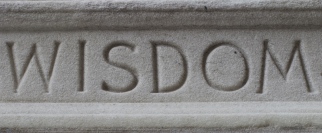Conclusion
In this series, we have looked at how Jesus gives us his own key for interpreting the Bible. This key is to see him in all the Scripture. When a person does this, it is the key to life itself, for it opens the way by which we may come to him. We have seen many NT passages that explicitly teach that Jesus was in the OT. We have learned how prophecy, typology, and the law each point to him in their own unique ways. We have also seen how there are certain words and ideas that, sometimes, profoundly and mysteriously describe an actual person in the OT, a person who is present with his people, who walks among them, who fights for them, who delivers them, who covenants with them, but who had not yet come in the flesh. We have seen that he is the Word (here and here), the Angel, the Name, the Wisdom, The Son, the Glory, and the Arm of the LORD.
None of these ideas are original to us; all have been written about by scholars, in journals, books, Bible dictionaries, etc. to one degree or another. Also, it isn’t that in this series we are somehow saying that all prophecy is about Christ in the same way, or that there is no such thing as anthropomorphism in this list of words (sure there are, we can think of each of these in the more abstract senses too), etc. But rather that in some ways, Christ is related to all of these things. Not in every way, but in some ways. We are not presenting an either/or, but a both/and. We just happen to be talking about Christ at this time.
To conclude this thought, in an absolutely fascinating opening to a book-sermon, Hebrews begins by telling us how Christ is superior to angels. After writing most of these posts, I was flabbergasted to discover that we find all seven of these word-ideas being applied to Christ in the span of just five verses. “In these last days [God] has spoken to us by his Son” (Heb 1:2). “He is the radiance of the glory of God” (1:3). “He upholds the universe by the word of his power” (1:3). “He sat down at the right hand of the Majesty on high” (1:3). “Having become as much superior to angels as the name he has inherited is more excellent than theirs” (1:4). “When the brings the firstborn[1] into the world, he says, ‘Let all God’s angels worship him’” (1:6). If we add the first verse of the book, we can add the first three categories we talked about (prophecy, typology, law): “Long ago, at many times and in many ways, God spoke to our fathers by the prophets” (Heb 1:1). Whoever wrote this letter, “got it.” Of course he did! He was inspired by God himself. But he also interpreted the Scripture in the sense that, I believe, the original authors knew at least something about, for they knew the Person of Christ in the OT.
I hope that this series has shown that learning to see Christ in the OT is both a science and an art. It takes knowledge, desire, and practice. The more we do it, the better we should get. Nevertheless, it is not always easy to do this correctly, and many have made mistakes. In fact, all of us have. Some have seen Christ where he probably is not, by not using sound rules of interpretation, by wanting to see things that aren’t there, or by not understanding that there is more than one way to see Christ in the OT. But others—sadly many others—have failed to see him where he clearly is, often in many, many places where he is to be found in the OT, in places that I believe OT peoples would themselves have had at least an inkling of some kind of plurality in a kind of Godhead.
People often ask me about this. “Then who should try?” Well, we all “try,” no matter if we try to see him or don’t are to see him at all. I’ve often told people that on The Day I face the LORD in judgment, he may very well ask me how I handled his word. Perhaps he would ask me one of two questions. The first, “Doug, why did you see my Son in places he was not?” The second, “Doug, why did not you see my Son in places where he is to be found?” As for me, I guess I would much rather err by seeing too much of the Savior than not enough, especially given his own explicit teaching on this subject, and the reprimand he gave the ordinary (non-Apostolic) disciple Cleopas and his unnamed friend on the road to Emmaus. He expected they would do this. I do not desire to read and teach the Bible as an end to itself. The Pharisees read it in just this way, and would not come to Christ to have life (John 5:40).
How about you?
[1] Recall our discussion of “first” and “firstborn” in the post on Wisdom and then the post on the Son.










